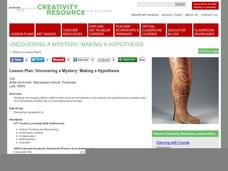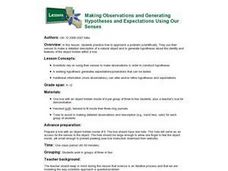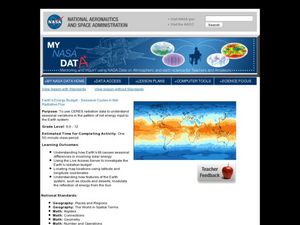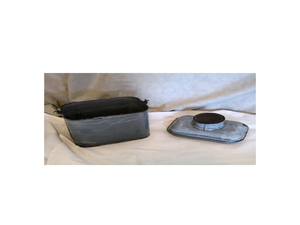PBS
Predicting/Making a Hypothesis
Students analyze information from a variety of sources in order to create a hypothesis about the origin of an interesting family artifact.They create alternative hypotheses based upon available information to demonstrate that some...
Education World
Predicting Pumpkins
If you want more pumpkin seeds, you should get a bigger pumpkin—right? Young harvesters use estimation skills to make a hypothesis about how many seeds they will find in a pumpkin before examining the real number inside.
Curated OER
Lesson: Taking Risks & Making Comparisons
Kids are asked how an Indian mandala was made. They devise a hypothesis and then use colored sand to test if their guesses were correct. They document the experience, examine a mandala, and write a comparative piece about the differences...
Curated OER
Lesson: Uncovering a Mystery: Making a Hypothesis
The class is presented with an image of a hand-carved leg. They act as art historians and hypothesize as to the purpose, nature, and creators of this amazing wooden leg. They compose journal entries from the point of view of an art...
Curated OER
Scientific Method: How Many Drops of Water Fit on a Coin?
Young investigators conduct an experiment using the scientific method. They see how many drops of water fit on a coin; have them conduct several different trials. This involves making a hypothesis, looking at controls, and introducing...
Curated OER
Predicting: Making a Hypothesis
Middle schoolers analyze information from various sources to create a hypothesis about the origin of a family artifact. Students create a hypothesis about the origin of the item and write a paragraph explaining why they believe the...
Curated OER
Making Observations and Generating Hypotheses
Young scholars practice how to approach a problem scientifically. They use their senses to make a detailed description of a natural object and to generate hypotheses about the identity and features of the object hidden within a box.
Curated OER
A Hidden Beauty
Expose the beautiful mystery of bulbs as young botanists learn all about these fascinating plants. They glean information from a short text before observing actual bulbs (consider an onion), and comparing their findings with predictions....
Omaha Zoo
I Like to Move It
What do lemurs do best? They move! Lemurs like to jump, run, hop, and climb and it's your class's job to document seven fun lemur behaviors. The class starts by discussing why lemurs are considered primates, and then they isolate seven...
Curated OER
Modeling changes to Ecosystems Part 1
Students record changes in an ecosystem. In this science lesson students make a hypothesis about changes in a terrarium. They record their observations. The students conduct an experiment to test their hypothesis.
Curated OER
Understanding the 1855 Census Database
Use data from the 1855 New York census to better understand the Irish immigrant experience during the late 19th century. Young historians analyze information from the census and build three hypotheses regarding the residents of the Five...
Curated OER
Exploration of "Pillbugs"
Fifth graders define vocabulary terms, identify the characteristics of a pillbug, and create a dichotomous key. Then they examine the pillbugs and make observations and record these observations. Finally, 5th graders observe specific...
Curated OER
Earth's Energy Budget - Seasonal Cycles in Net Radiative Flux
Students attempt to understand seasonal variation by viewing images of the energy received by the earth. In this weather lesson, students view images from NASA of the influx of energy from the sun and make predictions about resulting...
Curated OER
Lunch Pail
Explore a 1900s lunch pail. In this oral language and 1900s history instructional activity, students view a photograph of an old-fashioned lunch pail. Students describe the object and make predictions about what it is and its possible...
Curated OER
Deformed Frogs! - The Parasite Hypothesis
This project provides learners the opportunity to investigate parasites as a possible cause of the observed frog deformities. It asks students to view web-based evidence and interpret whether it supports the parasite hypothesis. Learners...
Statistics Education Web
Double Stuffed?
True or false — Double Stuf Oreos always contain twice as much cream as regular Oreos. Scholars first measure the masses of the filling in regular Oreos and Double Stuf Oreos to generate a class set of data. They use hypothesis testing...
Curated OER
The Old Man and the Sea: Directed Reading Thinking Activity
Can you find the themes from Ernest Hemingway's The Old Man and the Sea in other books? What about picture books? Compare the novel to a picture book with a lesson about making predictions and finding textual evidence.
Virginia Department of Education
Logic and Conditional Statements
If there is a conditional statement, then there is a hypothesis and conclusion. Pupils learn how to identify the parts of conditional statements. Class members continue to work with conditional statements and rewrite them in their many...
Curated OER
Hypothesis
Pupils study how to write several hypothesis. For this hypothesis lesson students divide into groups and complete several hypothesis.
Curated OER
Making Hypotheses
Fourth graders practice making hypotheses about what they believe occur as they perform an osmosis experiment in class. This experiment is designed to illustrate how important it is to make an accurate hypothesis.
Curated OER
Develop a Hypothesis
Students develop a hypothesis regarding the quality of a nearby body of water. They analyze locally collected data and compare it with data from different areas. They evaluate their original hypothesis as part of a larger unit.
Curated OER
Meteorological Predictions
Middle schoolers make a link between prediction and hypothesis in math and science. Based on data collected over one week, students evaluate the predictions of local weather forecasters, compare the predicted outcomes to the actual...
Curated OER
Plants, Ecology, Seed Planting
First graders use senses to examine objective or events, then gather and interpret data with instruments. They design invention to support or refute hypothesis, then generate, record, and organize data. They improve environmental...
Curated OER
Marine Habitats of Galveston Island
Four lessons introduce elementary ecologists to salt marsh and sandy beach habitats. In the first lesson plan, they place shells and other materials in vinegar to determine if they contain calcium carbonate. In the second lesson plan,...

























